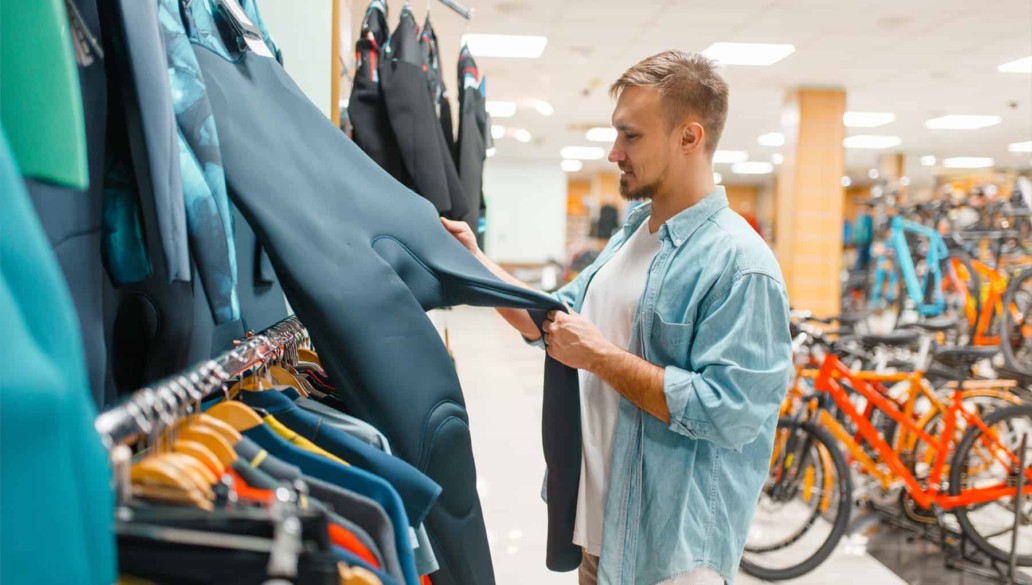Every year KPMG surveys thousands of people to collate statistics and identify trends that reflect the state of play in the UK retail industry.
The recently published 2020 Retail Survey contains valuable insights into how UK shoppers are spending their money and what retailers can do to meet their demands.
The survey focuses on six key areas: Black Friday, routes to market, the political and economic environment, the customer, delivery options and managing returns.
Let’s look at the key highlights of the survey and how we can use the data to shape ecommerce strategy as we move through 2020.
Black Friday
Black Friday is a huge event in the retail calendar and is growing bigger every year (we published a Venture Forge Black Friday planning guide ourselves). Landing conveniently on what is payday for much of the UK workforce, the 2019 figures showed higher spending than ever before. Barclaycard recorded a staggering 9% increase in transactions per second when compared to last year.
Unsurprisingly, the main driver for consumer purchases is price. 74% of respondents who made a purchase during the Black Friday/ Cyber Monday weekend put in the research and time to find the very best deals.
However, it seems that cost isn’t the only factor in the purchasing decision. Results this year show that 44% of consumers are buying from third-party retailers, such as department stores and sites like Amazon, rather than directly from the brand, citing convenience as one of the main reasons.
Although the Black Friday phenomenon continues to grow, demands for bigger discounts on a greater range of goods also grow, creating pressure on retailers to give the customers what they want whilst carefully watching the bottom line. It’s worth noting that Black Friday is not the be-all-and-end-all, and 58% of consumers still consider that Boxing Day sales offer better deals.
What Does This Tell Us?
Shoppers are looking for genuine bargains and maintaining integrity in your price drops will not only encourage sales but will also foster ongoing trusting relationships with your customers.
If you’re not already selling through third-party sites, consider doing so. It provides a convenience for the shopper that is hard to compete with and you can benefit from larger retailers’ marketing and good name. Amazon is a prime example of a platform that works hard to sell your goods for you.
Black Friday is undoubtedly a focal point of the year for UK shopping, but as consumers continue to regard Boxing Day as offering better sales, we are reminded that successful customer relationships are built throughout the year and a good ecommerce strategy must reflect this.
Routes to Market
The KPMG survey analyses the customer journey, how they access retailers and how they make purchasing decisions. This year’s survey confirmed what retailers are finding; that online purchasing is the shopping method of choice for a growing number of shoppers. 72% of all purchases made during the 2019 festive period were made online – an encouraging statistic for retailers investing heavily in ecommerce. Of those online shoppers, 45% are using mobile devices or apps to shop. Shoppers who prefer to visit bricks and mortar stores cite the overall shopping experience and the ability to try for size and directly compare products as the main reasons.
48% of millennials (those in their late 20’s and 30’s) say that watching a promotional video prompted a purchase.
What Does This Tell Us?
Online retail is worth the investment.
Consumers are continuing to see the benefits of shopping on-the-go or from the comfort of their homes and as ecommerce businesses become faster, better and smarter at what they do, we can only expect this to grow.
There is still a significant portion of the consumer population who prefer to visit the high street, but we can learn from their feedback to draw them into online shopping. Where the shopping experience is important to a customer, the online retail world needs to find new ways of creating an immersive experience in a digital sense. Lifestyle brands that offer more than just a purchasing transaction make their customers feel that they are part of something. Having a strong social media presence and a website that clearly represents brand values builds a sense of community and encourages loyalty. It’s also the ideal way to use video which not only brings customers closer to your brand but also directly affects sales, as the survey revealed.
Online clothing retailers are well aware of the ‘trying for size’ factor that remains a strong influence on consumers deciding to visit physical stores. Clever ways to counter this can be seen on websites like Good American, which shows their jeans on models of varying sizes so the customer can get a true sense of how they will look in them. Online returns policies also play a big part in influencing shoppers who would rather try things on in a store than have to pay for multiple returns when garments don’t fit well.
The Political and Economic Environment
Unsurprisingly, Brexit features highly on the factors that are affecting the UK retail market at the moment. Although Black Friday shoppers weren’t deterred, the uncertainty has had ongoing implications for investments and planning.
Looming tariffs are a worry and some retailers are already looking outside the EU for suppliers to mitigate the impact in a bid to avoid passing the price increases down to the customer.
Currency fluctuations will also play a part. There is hope that the GBP may strengthen against the USD and euro which may help mitigate some of the financial impacts of leaving the EU.
What Does This Tell Us?
Preparation is key for riding out the upheaval of Brexit.
For retailers who deal with international suppliers, logistics and financial planning are paramount. The survey suggests that up to now, consumer spending seems to be largely unaffected, but for companies that are forced to pass costs down to the customer that might change.
The Customer
2019 was a rocky road for retail with many well-known stores suffering financial difficulties or closing their doors. Household names such as LK Bennett, Mothercare and Mamas & Papas falling victim to the changing face of UK shopping was a stark warning to us all.
Companies that seem to be thriving through these big changes are listening carefully to what customers want, with a focus on ethics and sustainability as the UK shopper becomes more environmentally aware.
The survey revealed that subscription services such as Amazon Prime and loyalty schemes can be effective, though with 64% of consumers actively seeking out new brands, retailers must remain vigilant.
‘Buy Now, Pay Later’ initiatives are shown to persuade 15% of shoppers to buy more and social media marketing has become one of the most effective marketing tools, with a third of shoppers under the age of 40 using it to communicate directly with brands.
The overall customer experience is brought into focus once more, as the survey highlights that this is a key way of attracting a loyal core consumer base.
… it’s more important than ever to invest in innovations that could transform the customer experience, no matter how costly …
Pg 26, KPMG Retail Survey 2020
What Does This Tell Us?
Using innovative ideas to stay ahead of the curve is how successful retailers are thriving despite the economic uncertainty of Brexit.
Consumers are still spending, but on their own terms, as they are faced with a choice like never before. Environmental considerations are becoming more important for shoppers and company ethos is competing with price as a significant driver for sales.
In short – if you stand still, you’ll get left behind. Don’t be afraid to invest in change and innovation to allow you to compete in a crowded market.
Delivery Options
Maintaining a good customer experience for the ‘Last Mile’ while using third-party carriers remains a challenge for retailers. Although finding a reliable delivery service can be costly, passing this cost down to the shopper is not received well, with 73% stating that they would be dissuaded from a purchase if there was a delivery charge. Customers are not prepared to wait either, with 43% selecting next day delivery.
Although some environmentally conscious consumers preferred to use Click and Collect, the closure of some outlets means that it’s not always an option.
The survey notes that for online retail transactions, “delivery constitutes the only human interaction in the purchasing process”. It’s understandable then, that customers place a high value on how smoothly this stage of the process works.
What Does This Tell Us?
The customer experience doesn’t end at the checkout.
Prompt delivery (preferably free) by a reliable delivery company is what’s expected by most shoppers. This may be a hard demand to consistently fulfil, but it’s worth the time and effort to maintain customer satisfaction right up until the last point in the buying process. As Click and Collect was specifically mentioned by some shoppers, it remains wise to provide it as an option to cater for different preferences on how people receive their goods.
The Returns Issue
This year’s survey found that returns account for as much as half of all purchases, costing British retailers £7billion last year. One of the biggest problems that many retailers experience is customers who use or wear a product then attempt to return it. It remains a fine balance between managing these ‘serial returners’ whilst also offering an easy and effective returns process to please customers.
In a bid to replicate the ‘try for size’ aspect of visiting physical shops, some customers are buying a range of products to compare, with the intention of returning the unsuitable goods. The survey found that the introduction of the ‘Buy Now, Pay Later’ schemes have an impact on returns, with retailers experiencing a bulk return 30 days after purchase when the payment is due.
It is predicted that a trend towards ‘re-commerce’ is likely. This involves shoppers buying second-hand goods for environmental reasons, moving away from fast fashion and throwaway items.
What Does This Tell Us?
Getting the balance between providing an easy and cheap returns policy and managing high volumes of returns (genuine or otherwise) is a huge challenge.
The costs of this are significant for a business, but there seems to be no way to avoid them at the moment. 63% of consumers expect free returns, and if we charge to deter ‘serial returners’, we also run the risk of damaging sales from loyal customers.
Outlook For 2020
Although times are tough for UK retail, the outlook is surprisingly promising. KPMG predicts at least 1% growth in 2020 with independents and smaller retailers benefitting from this the most, largely due to their ability to be nimble and respond quickly to market demands.
Political changes will continue to affect the UK market and businesses must find ways to work around these issues until the landscape settles down.
If you’d like help with future-proofing your online retail business, get in touch for an informal chat.

